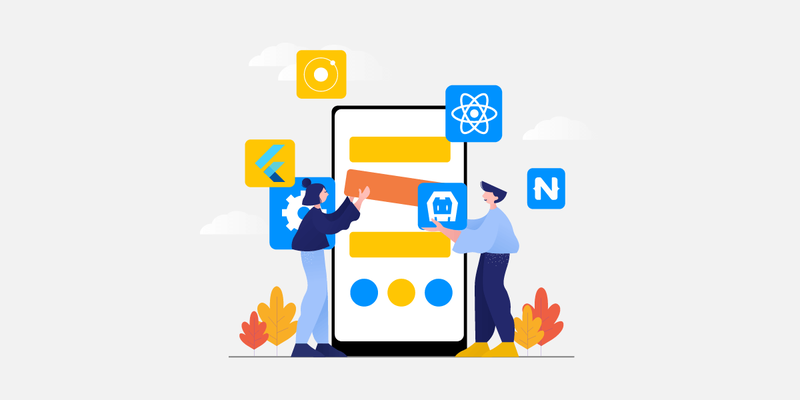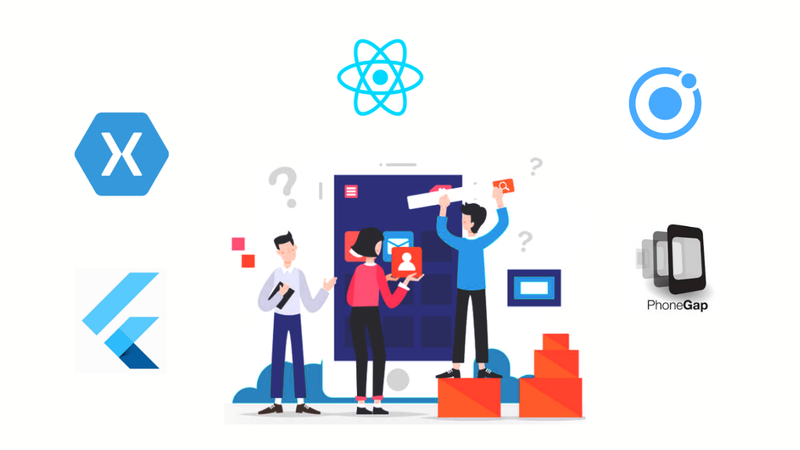Cross-Platform App Development: Top Tools and Trends
Businesses trying to maximize their budget without compromising their quality. It's difficult to keep expenses low with native apps. Many businesses use cross-platform app development as a way to use advanced development tools at an affordable price. They produce apps that are compatible with a lot of mobile operating systems.
If you decide to invest in cross-platform app development, you should analyze everything.
How to develop a cross-platform app

Cross-platform apps are compatible with different operating systems. They are created with a single code system. For a broader audience, cross-platform app development allows you to release high-quality products faster.
It is important to estimate your needs and goals before using a platform. The cost-effectiveness of cross-platform app development is one of the things that startup projects appreciate.
Mobile app cross-platform development: tools and frameworks
Mobile cross-platform app development involves a wide range of tools. Check out the most popular options.

- Xamarin
There is a software called Xamarin. Microsoft brought an open-sourced mobile framework to the market. Thanks to a single shared codebase, reusability can be achieved.
- Ionic
There is a framework for idiosyncrasy. Ionic is a complete open-source mobile app development framework. It is designed to help developers create high-quality user interfaces for mobile apps. The integrated Android Virtual Devices (AVDs) can be used to emulate the developed apps. User-oriented features and creative user design are admired by Ionic.
- Sencha
Sencha is a Latin word. The tool is intended to design, develop, and test data-based web apps, UI frameworks, and test options. Being a multi-platform app development tool, it refers to java and javascript frameworks to gain progressive and modern norms. It's been able to deliver data apps for desktop computers, smartphones, and tablets. Sencha has more than 50 integrated and customizable widgets.
- Flutter
There's a word for it. One of the most advanced frameworks is intended for the development of a native interface for the two mobile operating systems. It provides development tools for web, desktop, and embedded applications. It's possible to verify the behavior of a method or class with testing. Flutter is liked by developers because of its efficient graphic engine and integrated graphic engine.
- React Native
There is a Native app. The demands of hybrid frameworks are addressed by a JavaScript-based cross-development platform. It has code reusability and easy-to-use functions. In addition, React Native knows how to create a native-like interface by means of third-party plugins.
Testing cross-platform apps
High accessibility is required from phones, tablets, and desktops. It needs to be tested for different combinations. Does the app you have meet the needs of real people? Many platforms can help you answer this question.
Some of the most efficient cross-platform testing tools are listed here.
- The Appium. An open-source test automation framework is intended to check the function of native, hybrid, and mobile web apps. It supports tests in all languages. Everyone is able to create and execute automated acceptance tests without coding skills. There are test cases written in natural language. It works with Ruby, Java, DotNet, and other programming languages.
- Selendroid. A tool that can be used to test hybrid apps, as well as web apps. No app code modification is required. The framework can be integrated into various devices. The test coding is efficient.
- Frank is a man. Functional tests in Cucumber can be executed on a remote device with the help of an open-source cross-platform testing framework. It has a Symbiote app inspector and writes structured requirements and acceptance tests. Frank is often referred to for emulators and web-based applications.
- Browser shots. A cross-browser testing framework shows web design in various browsers and operating systems. It has a wide range of features. Customer support is available in many browsers.
Conclusion
The success of your business project can be determined by the cross-platform app development tools. App development processes are redefined by them as they streamline, maximize and secure your application. The right tools can help developers maximize efforts.
A professional cross-platform mobile app development company can give you a good point of current needs, recent trends, and future prospects. It is possible to decide based on your business needs.
We at Decodermind are skilled at developing dependable, scalable cross-platform mobile applications. So, if you're interested in developing a cross-platform mobile app, get in touch with us. We can help, whether you need support with development or a full app rollout.

 Hamid Salman
Hamid Salman